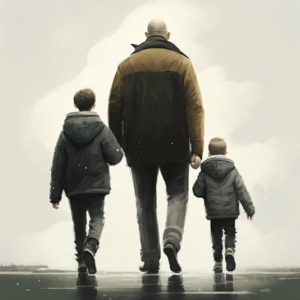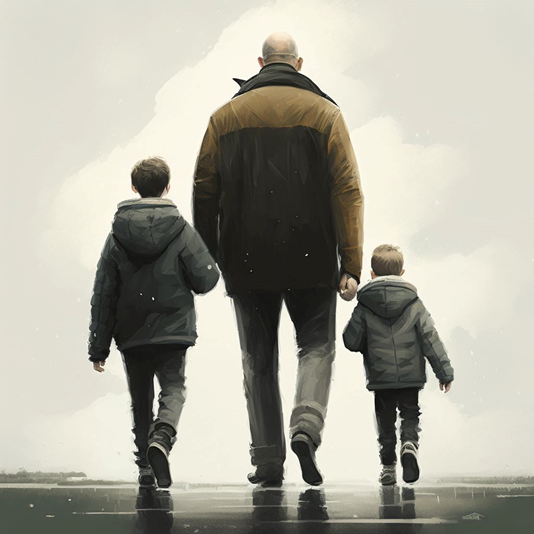Most of y’all know that I submit regularly to the “Postcards” series from Raconteur Press. For those aren’t aware, it’s an open submission call that happens from time to time whenever the gang go to a convention. They send an AI generated image to anybody who asks, and you must write a story of precisely 50 words, no more, no less, inspired by the image. You only have until the Monday after the con to submit the story, so there’s a time pressure added to the word count. It’s a fun challenge, and I’ve made the cut for two of the four volumes.
I thought I’d share my process for any of you that are interested. (BUYER BEWARE: This story did NOT make the cut.)
This is the image I received for the first postcards anthology.
My first step is to look at the picture and write down 10-20 words and phrases that quickly come to mind. I spend no more than a minute or two on this. For this image, I came up with:
- desolate
- wet pavement
- father and sons
- bleak
- walking away
- where’s Mom?
- cloudy gray sky
- jackets and parkas
- standing straight and shoulders back
- moving on
Next, I blow up the image, and look for fine details. Little things jump out and become hooks for the story, fleshing out the characters, or providing bits of the plot.
- The father is wearing a mask. There’s some kind of plague. Or the atmosphere is not healthy.
- Their posture is not slumped and defeated. They are walking away, but they are also walking forward. They’ve taken a hit, but they aren’t defeated.
- The older son is holding onto his father’s hand, looking for guidance.
- The younger son is less aware of what’s happened. He still believes that Daddy can fix anything and their current troubles will pass.
Then I sit down and write it out, ignoring word count. I tell the story conventionally capturing every nuance and detail.
Only then do I count the words. It isn’t pretty. In this case:
We leave the hospital, my boys and me. We’re all that’s left of our family.
We came to this damned place to build a new life, to escape the mess we’ve made of Earth, but that never works. We bring our problems with us.
Carol’s dead.
The Pain is what we call it. Neuropathic necrosis is what the docs call it. Untreatable. Incurable, and excruciating. It kills nearly everyone who contracts it, and that’s a blessing. The survivors don’t have much to look forward to.
Cathy’s suffering is over, but ours, well, it’s just beginning.
The evening rain is falling as programmed by the Colonial Terraforming Agency as the boys and I walk home.
Robert Jr puts his hand in mine while Billy skips along.
I’m gutted. No hope, no plan, no wife.
But I can’t let that show. God help me, but they need me and I have to be there for them.
“What do we do, Dad?” RJ asked quietly, holding in his tears for Billy’s sake.
“Just keep walking, son. That’s all we can do.”
Boys become men too soon in this world.
Next, I put it away for a while, at least an hour or so, maybe even overnight. When I pick it back up, I summarize the story. This let’s me isolate what the story is really about, which lets me condense it to the bare bones, eliminating extraneous bits and keeping only the most important parts, whether it is character beats or plot points or descriptions.
In this case:
A man walks home with his two sons after his wife dies of an illness. He knows that despite his own pain, he must be strong for his boys. He passes that lesson along to his oldest son. It’s too soon, but that’s life.
Right away, I see I can delete most of the stuff about the illness. And I don’t need the colonial setting anymore; the story can apply anytime, anywhere. The meat of the story is told in 44 words. But they aren’t the right words. The story is told, not shown. It’s time to go back to the first draft and edit.
My next draft looked like this:
We leave the hospital, my boys and me. We’re all that’s left of our family.
Carol’s dead.
The Pain is what we call it. Cathy’s suffering is over, but ours, well, it’s just beginning.
Robert Jr puts his hand in mine while Billy skips along.
I’m gutted. No hope, no plan, no wife.
God help me, but they need me and I have to be there for them.
“What do we do now, Dad?” RJ asked quietly, holding in his tears for Billy’s sake.
“Just keep walking, son. That’s all we can do.”
Boys become men too soon in this world.
I’m still way over the word count, but it’s manageable now.
I look back at the image, and see how much of the story is conveyed by the image. Maybe I don’t need to repeat what’s already there. Which sentences provoke an emotional response and which are just filler? Can I rewrite sentences to get rid of chronological cues and let the structure and order of the sentences convey sequence? Can I get rid of dialog tags, or if I hae to keep them, can I make them multitask, providing emotional content as well as narrative?
Finally, I go through the words themselves and look for better, stronger word choices for each one. If I can find words with multiple layers, so much the better. I rely primarily on my own vocabulary, but I’ll crack open a thesaurus as needed to jump start my imagination if necessary. Strong verbs and descriptive nouns remove the need for adjectives or adverbs, and misusing (pardon, I mean creative use of) punctuation can also shave off a few words.
This is usually the longest part of the work, and the most fun for me. Trying out different words occassionally inspires me to rewrite an entire sentence or move it to another place in the story for better impact.
The last step is finalizing the title. I usually have a version of the title when I write the summary, but as I refine and move things around, different titles occur to me, but by this point, I want the title locked down. I’ll review the story and make sure that every word builds to the titles. It’s a way to cheat and get a few extra words into the story.
Here’s the final version:
Carry On
Carol’s dead.
It’s a blessing. She’s beyond the Pain now.
I’m gutted. No hope, no plan, no wife, and no mother for my boys.
I’m not enough, but I’m all they have.
“What do we do?” RJ asked.
Sometimes, a boy learns the truth too early.
“Just keep walking, son.”



